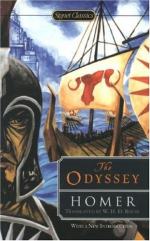PREFACE.
There would have been less controversy about the proper method of Homeric translation, if critics bad recognised that the question is a purely relative one, that of Homer there can be no final translation. The taste and the literary habits of each age demand different qualities in poetry, and therefore a different sort of rendering of Homer. To the men of the time of Elizabeth, Homer would have appeared bald, it seems, and lacking in ingenuity, if he had been presented in his antique simplicity. For the Elizabethan age, Chapman supplied what was then necessary, and the mannerisms that were then deemed of the essence of poetry, namely, daring and luxurious conceits. Thus in Chapman’s verse Troy must ’shed her towers for tears of overthrow,’ and when the winds toss Odysseus about, their sport must be called ‘the horrid tennis.’
In the age of Anne, ‘dignity’ and ‘correctness’ had to be given to Homer, and Pope gave them by aid of his dazzling rhetoric, his antitheses, his nettete, his command of every conventional and favourite artifice. Without Chapman’s conceits, Homer’s poems would hardly have been what the Elizabethans took for poetry; without Pope’s smoothness, and Pope’s points, the Iliad and Odyssey would have seemed rude, and harsh in the age of Anne. These great translations must always live as English poems. As transcripts of Homer they are like pictures drawn from a lost point of view. Chaque siecle depuis le xvi a ue de ce cote son belveder different. Again, when Europe woke to a sense, an almost exaggerated and certainly uncritical sense, of the value of her songs of the people, of all the ballads that Herder, Scott, Lonnrot, and the rest collected, it was commonly said that Homer was a ballad-minstrel, that the translator must imitate the simplicity, and even adopt the formulae of the ballad. Hence came the renderings of Maginn, the experiments of Mr. Gladstone, and others. There was some excuse for the error of critics who asked for a Homer in ballad rhyme. The Epic poet, the poet of gods and heroes, did indeed inherit some of the formulae of the earlier Volks-lied. Homer, like the author of The Song of Roland, like the singers of the Kalevala, uses constantly recurring epithets, and repeats, word for word, certain emphatic passages, messages, and so on. That custom is essential in the ballad, it is an accident not the essence of the epic. The epic is a poem of complete and elaborate art, but it still bears some birthmarks, some signs of the early popular chant, out of which it sprung, as the garden-rose springs from the wild stock, When this is recognised the demand for ballad-like simplicity and ‘ballad-slang’ ceases to exist, and then all Homeric translations in the ballad manner cease to represent our conception of Homer. After the belief in the ballad manner follows the recognition of the romantic vein in Homer, and, as a result, came Mr. Worsley’s admirable Odyssey. This masterly translation does all that can be done for the Odyssey in the romantic style. The smoothness of the verse, the wonderful closeness to the original, reproduce all of Homer, in music and in meaning, that can be rendered in English verse. There still, however, seems an aspect Homeric poems, and a demand in connection with Homer to be recognised, and to be satisfied.




